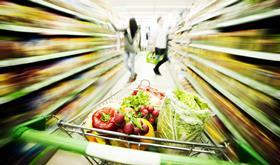
Grocery prices are continuing to rise, and show no sign of falling back, new analysis shows.
Figures from Kantar Worldpanel for the 12 weeks to 26 March 2017 show the price of everyday goods is up by 2.3 per cent compared to the same time last year, with rising prices costing the average household an extra £21.31 during the past 12 weeks.
“We expect inflation to continue to accelerate, and as a result we’re likely to see consumers looking for cheaper alternatives,” said Fraser McKevitt, head of retail and consumer insight at Kantar Worldpanel, who added that there is also a reduction in promotional activity. That has meant the proportion of spend on promotion is now just 32.9 per cent, which represents a 5.5 percentage point drop on a year ago.
Own-label lines are seeing growth as consumers switch from more expensive brands, while healthy products have had the traditional post-Christmas boost as diets improve in the first quarter of the year.
Among the retailers, the discounters continued to strengthen their influence by reaching a combined 11.7 per cent market share, with sales growth of 15 per cent making Lidl the fastest-growing store in the period. Aldi also saw a 14.3 per cent uplift, and an ongoing store-opening programme has attracted an additional 1.1 million shoppers to the two discounters in the last three months.
Iceland has also seen 9.8 per cent growth, attributed to its strong performance in fresh and chilled lines.
Among the big four, Morrisons was the only one to grow sales thanks to its produce and chilled convenience, although Kantar added the caveat that the late Easter made direct comparisons to last year uneven.
Tesco saw strong growth in its own-label Farm Brands, with 64 per cent of the supermarket’s shoppers picking up something from the range over the past three months.



